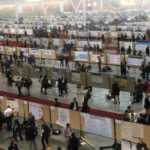The ACR/ARHP Annual Scientific Meeting is the premier event for specialists in the field of rheumatology. At this year’s meeting, basic researchers will have multiple opportunities to increase their knowledge, and there will be something for every interest.
There are several exciting offerings planned for basic researchers, but they aren’t the only attendees who can benefit from basic science sessions—clinicians can attend these talks to obtain important information from the bench that will directly help them when they return to the bedside.
“There will be many wonderful basic science talks at the ACR’s annual meeting in Atlanta,” explains ACR Annual Meeting Planning Committee Member R. John Looney, MD. “As an academic clinician and someone involved in clinical trials, I will be particularly interested in talks that provide insight into the pathogenesis of autoimmune diseases and their complications. I have always been fascinated by these talks. As a bonus, they have proven to be an excellent source of ideas for new therapies.”
Here are a few basic science sessions the planning committee has identified as being of interest to both basic researchers and clinicians.
Innate Immunity
Innate immunity plays a key role in inflammatory diseases such as gout and pseudogout and can play a role in chronic autoimmune inflammation and inflammation induced by damage or injury. The molecular details of signals used in innate immunity are now being realized, raising the possibility of new therapeutic interventions. To get the latest updates on innate immunity, be sure to add these three sessions to your annual meeting itinerary:
- ACR Immunology Updates for Clinicians: Innate Immunity and Inflammation (Monday, November 8; 9:00–10:00 am)
- ACR Basic Science Symposium: Toll-like Receptors and Inflammation: Towards Innovative Treatment of Rheumatoid Arthritis (Monday, November 8; 2:30–4:00 pm)
- ACR Basic Science Symposium: Cell Death: Receptors, Sensors, and Inflammatory Pathways (Wednesday, November 10; 2:30–4:00 pm)
Macrophages
Macrophages are ubiquitous and extremely adaptable. They can become Kupffer cells, type A synoviocytes, alveolar macrophages, or osteoclasts. They can clear debris, kill microorganisms, and enhance wound healing—or, they can cause chronic inflammation, fibrosis, osteolysis, and atherosclerosis. Understandably, regulating macrophage differentiation and activation has become a hot topic in rheumatology. If you are interested in macrophages, don’t miss the following sessions:
- ACR Immunology Updates for the Clinicians: Macrophage Differentiation (Tuesday, November 9; 7:15–8:15 am)
- ACR Basic Science Symposium: A Critical Role for Lipid Metabolism in the Interplay Between Atherosclerosis and Autoimmune Disorders (Wednesday, November 10; 4:30–6:00 pm)
Epigenetics
Epigenetics—the alteration of mesencymal cells to a more inflammatory and/or profibrotic phenotype—is one of the great challenges of chronic inflammation. Although there has been debate, this transformation appears to be due to heritable, nonmutational changes in gene regulation (i.e., epigenetic changes). Similarly, epigenetic changes in gene expression induced by DNA methylation inhibitors such as hydralazine or procainamide may be responsible for certain types of drug-induced lupus. These days, epigentics seems to be a growing topic of discussion, and below are two sessions that address this topic:
- ACR Basic Science Symposium: The Revolution of Epigenetics in Autoimmunity (Monday, November 8; 4:30–6:00 pm)
- ACR Immunology Updates for the Clinicians: Epigenetics 101 (Wednesday, November 10; 8:45–9:45 am)
Ready, Aim, Get Funded!
The ARHP Research Committee will hold a workshop called “Ready, Aim, Get Funded!” at the ACR/ARHP Annual Scientific Meeting in Atlanta on Wednesday, November 10. Specific aims are one of the most important pieces of the grant application, but often they are the most difficult to write. This workshop will teach a hands-on approach to writing strong specific aims, including examples of good and bad specific aims. Participants must bring a one-page draft of specific aims for an actual grant proposal for review and to get one-on-one expert feedback. Space is limited so register early at www.rheumatology.org/education.
Stem Cell Therapies
Stem cell therapies may be one approach to correct epigenetic changes in patients with chronic inflammation or fibrosis. Remarkably, such therapies have recently become very practical, and trials in rheumatic diseases are now underway. The two sessions that will provide a succinct update on stem cell therapies are:
- ACR State-of-the-Art Lecture: Stem Cell Reprogramming: Molecular Mechanisms and Clinical Applications and Implications (Wednesday, November 10; 10:45–11:45 am)
- ACR Immunology Updates for the Clinicians: Therapeutic Use of Mesenchymal Stem Cells in Rheumatologic Diseases (Thursday, November 11; 7:30–8:30 am)
B Cells
B cells, anti-CD20, and anti-BAFF monoclonal antibodies have been shown to be effective for autoimmune disease, but how these therapies actually work is not at all clear. Thus, the roles B cells play in immunity need to be re-examined. At this year’s meeting, these two sessions will shed some light on this important area of research and help facilitate additional discussion:
- ACR State-of-the-Art Lecture: Toll-Like Receptors Activation of B cells in Autoimmune Disease (Monday, November 8; 7:30–8:30 am)
- ACR Basic Science Symposium: B Cell Effectors and Regulators (Wednesday, November 10; 2:30–4:00 pm)
Autoimmune Disease Prevention
Patients who develop systemic lupus erythematosus, RA, or other autoimmune diseases such as type I diabetes have a long period of asymptomatic autoimmunity. Researchers in other specialties have performed clinical trials attempting to prevent the transition from asymptomatic autoimmunity to autoimmune disease. We are now beginning to see similar attempts in rheumatology. This year, two basic science symposia are dedicated to this topic:
- ACR Basic Science Symposium: The Biology of Citrullination (Tuesday, November 9; 2:30–4:00 pm)
- ACR Basic Science Symposium: The Preclinical Stage of Rheumatoid Arthritis: Towards Prevention of Disease? (Tuesday, November 9; 4:30–6:00 pm)
The 2010 ACR/ARHP Annual Scientific Meeting will be held November 6–11 in Atlanta. For more information on this year’s basic research offerings, visit www.rheumatology.org/education.
